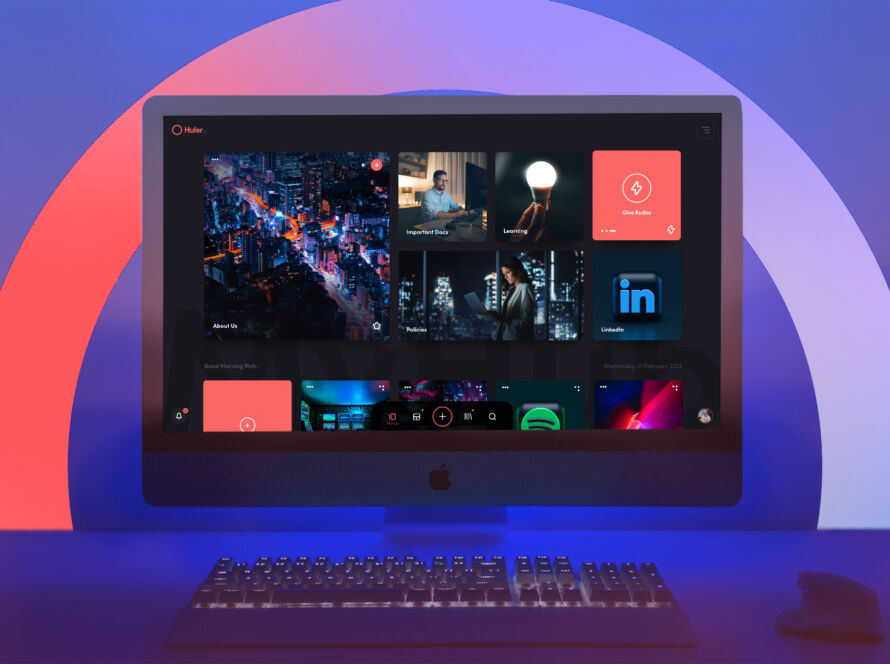Familiar with that gnawing feeling that you’re not as good as everyone thinks or expects you to be, and you’re just one step away from being unmasked as a fraud?
Well, say hello to imposter syndrome.
But don’t worry; you’re not alone. In fact, 70% of us are likely to experience imposter syndrome at some point in our lives.
Sadly though, imposter syndrome does impact the way we work.
It’s been proven to affect productivity and efficiency, increase rates of burnout, and diminish creativity.
Creativity is proven to be crucial for a successful workplace, so we explored the impact imposter syndrome can have on your creativity and ways to overcome it.
We even caught up with the most creative person we know, Huler’s very own Graphic Designer, Sophie Hibberd, for some words of wisdom.
Why is creativity important in the workplace?
When you hear the word ‘creativity’, you might envision artists, writers, or designers who are passionately crafting masterpieces on a daily basis.
But here’s a secret: creativity isn’t confined to these stereotypical ‘creative’ roles.
In fact, most roles require creativity as a skill, regardless of job title.
For Human Resources (HR) that might mean designing an inclusive onboarding process or creating engaging training materials.
For Engineers, it might mean designing innovative solutions, improving existing technologies, or pushing the boundaries of what’s possible.
For finance professionals, they might be looking for creative ways to save money, streamline processes or develop new investment strategies.
Whatever the profession, creativity can help you elevate performance because it aids:
Problem-solving
Creativity equips you with the ability to approach these challenges from unique angles, find innovative solutions, and turn setbacks into opportunities.
Adaptability
Creative thinkers thrive in ambiguity, readily embrace change, and proactively seek fresh, new approaches.
Communication
Whether you’re delivering a presentation, writing an email, or explaining complex concepts, creative communication captures the attention of the audience and fosters understanding.
Collaboration
When individuals bring diverse ideas and perspectives to the table, it sparks innovation and leads to more robust, well-rounded solutions.
Productivity
Creative problem-solving streamlines processes and reduces wasted time and resources.
Leadership
Creative leaders inspire teams to think creatively as well. They encourage innovative thinking, fostering an environment where employees feel valued and engaged.
Imposter Syndrome and its causes
Imposter syndrome is a bit of a psychological phenomenon, that’s often characterised by an overwhelming sense of self-doubt.
It can feel like a shadow that looms over your accomplishments and successes.
It can make you believe that you don’t deserve the praise, recognition, or opportunities that come your way and instead, you attribute achievements at work to luck, timing, or the hard work of others.
Understanding the root cause of imposter syndrome can be a crucial step in overcoming it:
Perfectionism
Unrealistic expectations and the constant pursuit of perfection have been known to lead to imposter syndrome.
Comparison
Constantly measuring your success against others can often undermine your self-esteem.
Childhood influences
Early experiences, such as high parental expectations or excessive criticism, can contribute to imposter syndrome.
Lack of validation
Not receiving validation or recognition for your achievements can often fuel feelings of inadequacy, especially where you see it given to others.
Cultural and societal factors
Societal pressures and stereotypes can amplify imposter syndrome, especially for marginalised groups.
Imposter syndrome’s impact on creativity
Imposter syndrome can be a bit of a creativity-killing ninja that lurks in the shadows, here’s why:
Self-doubt slows you down
When you doubt your abilities, you second-guess every creative idea. This hesitation can lead to missed opportunities and stalled projects.
Fear of failure
Imposter syndrome can make you terrified of making mistakes. But guess what? Creativity thrives on experimentation, and sometimes, that means getting things wrong before you get them right.
As Sophie said, “Imposter syndrome can be the nemesis of a designer. Design is very subjective, not everyone will adore every piece of work you create, but it can be hard not to take criticism to heart.
“We have to remember as designers, that gaining feedback isn’t a personal attack on you and your work, but is a way for us to learn, and by learning, we become more confident in our ability.”
Hiding your brilliance
If you’re afraid that your ideas aren’t good enough, you might keep your creative gems hidden which means your team then loses out on your unique insights.
How to combat imposter syndrome
Imposter syndrome isn’t something that will disappear overnight, but there are steps that may help take back control:
Remember you’re not alone
It can be helpful to remember that many others in your industry or team are feeling the same, so don’t be afraid to share your feelings with a trusted colleague or friend.
Embrace mistakes
Instead of fearing failure, embrace it as part of the creative process. Every misstep is a lesson learned and a step closer to success.
Self-reflect
Take a moment to recognise your accomplishments and talents. Celebrate your wins and remember that you’re not alone in your doubts.
Consider creating a ‘win journal’ to reflect on when you’re facing self-doubt.
This was a particular favourite for Sophie, who added “This was a great tip that I actually got from one of my colleagues.
They told me to create a treasure chest of positivity to gather up all those praise-worthy moments, to screenshot compliments, and to save uplifting notes.
That way, when imposter syndrome comes knocking, crack open that treasure chest and use it as your personal reminder that you’re not an extra in this story, you’re a protagonist.”
Continuous learning
If you continually invest in your skills and knowledge, the more you learn, the more confident you become in your abilities.
Sophie shared: “As an artistic person, you’ve probably poured your heart and soul into your work, and when criticism comes your way, it can really hurt. It’s easy to forget that the feedback is usually there to guide you down the correct path for your project’s end goal.”
Creativity isn’t a talent reserved for a chosen few
Creativity is a mindset and a skill that anyone can nurture. So, kick that imposter syndrome to the curb and let your creative light shine in whatever role you’re in. You’ve got this.




